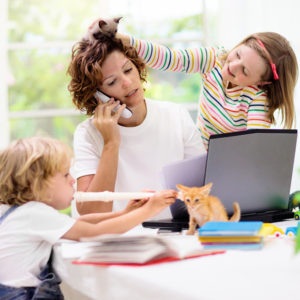Last month, I put my kids back into daycare.
Is it because I don’t care about my kids and dismiss the risk of COVID-19? Of course not. I care deeply about the well-being of my children and I take the human consequences of the pandemic seriously.
But I can also calculate risk and measure tradeoffs. I’ve read the American Academy of Pediatrics’ recommendations, which suggest that the harms caused by remote learning (like social isolation and severe learning loss) outweigh the risk of coronavirus to children.
I’ve read the studies demonstrating that remote learning has negative long-term effects on kids, which can lead to “poorer, shorter, less fulfilling lives.”
Based on my discussions with our school’s administrators and teachers, I’m confident they’ve crafted a solid plan to reduce the potential risk of infection through social distancing, masks and common sense. And I’m willing to take responsibility for my choice.
I also receive tremendous satisfaction from doing my job and doing it well, and I know I cannot do it as well when my kids are at home.
There’s been a fair amount of sneering at working parents, as if they’re malicious for wanting to work when the reality is that they’re working to be productive, to provide for their families, to maintain their mental health, and to do the best they can for their children.
Not to mention that not all jobs can be performed on a remote basis — a fact many upper-middle-class professionals seem to overlook from their comfortable home offices.
That’s not to say it’s an easy choice.
Putting my kids back in school has meant having to endure painful separation from family members and friends who don’t share the same level of risk tolerance, or who, because of their age or health status, cannot risk any level of exposure.
When my father was hospitalized last month with a rare auto-immune disease, I wasn’t able to visit him in part because my kids were in school. Not everyone would make the same choice, but that’s what makes us individuals.
If my kids were just a few years older, I wouldn’t have the choice to return them to school, because in California (where I live), Gov. Gavin Newsom has effectively decided to close all schools throughout the state, regardless of what parents, local health authorities or individual teachers want.
The idea of one person choosing for every man, woman and child whether to go back to school is contrary to fundamental American ideals. Embedded in our Constitution is the fundamental right to direct the upbringing of one’s children.
As the Supreme Court has stated, “the child is not the mere creature of the state.” Respect for people’s autonomy requires us to “presume that fit parents act in the best interests of their children,” leaving the state with little reason to “inject itself into the private realm of the family” or to upset parental choices.
Newsom’s one-size-fits-all solution is a vast assumption of power that takes rational debate out of the public sphere. And it deprives people of the ability to decide what’s best for themselves and to choose (or to create) innovative solutions that fit their own needs.
There is no one “correct” choice about whether to send kids to schools because there are tradeoffs to each option. The risk of infection is real, and we’re still learning about the effect of COVID on kids.
The risks created by closing schools to in-person learning are also real, particularly for kids from lower-income families (who get their only meals from school), or for special-needs children (for whom remote learning will not work), or for parents who will be forced to leave their children unsupervised at home.
Not everyone will weigh these risks in the same way.
The same should be said for teachers; it should be their choice about whether to return to in-person learning. If they don’t feel comfortable, they shouldn’t be forced to go back ― although there’s a separate question of whether they should be paid full salary and benefits if they do not return to work.
The teachers at my kids’ school have expressed that they prefer to be back at work; they feel safe under the new protocols and they derive joy from being there.
Yet, for primary school through high school, Newsom has taken that choice off the table. Allowing politicians to choose rather than parents, teachers and local health officials leads to the funny result that schools are closed while retailers, racetracks, casinos and the entire entertainment industry remains open.
There are no easy choices here, but making tough choices is the privilege of being human. In an uncertain situation, allowing people to decide for themselves respects their autonomy and dignity. I’m grateful that this choice was mine to make.

